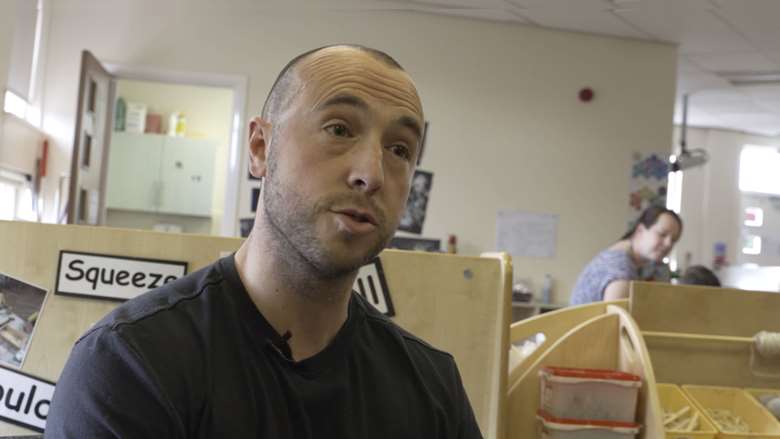30 Hours, Part 7: Working in Wigan
Hannah Crown
Monday, May 15, 2017
Parents in Wigan have been encouraged to get a job or take on more work because of the 30 hours, finds Charlotte Goddard

Childminders are highly valued in Wigan,’ says Jayne Challiner, early years service manager at Wigan Council. ‘We have 97 per cent who have received an EYFS inspection and have a Good or Outstanding outcome. Following briefing sessions with childminders earlier this year, we have seen an increase in the number applying to deliver the fund[ed] hours – the current figure is 77, and eight further applications have been requested, compared with the 50 childminders we had before January 2017.’
The council offers regular support visits and says it is actively looking to attract new people into the profession. ‘We are holding a childminder fun day, so anyone interested in becoming a childminder can come down and experienced childminders will be available to talk about the job and the support they would get,’ says Ms Challiner.
Childminders, along with private, voluntary and independent settings, are seeing their hourly rates increase, from £3.36 to a final rate of £4.04 in April. Now that all types of setting are getting the same rate, nursery schools will have their funding reduced by 91p from £4.95. With providers reporting delivery costs of between £1.60 and £9.55 per hour, most already charge for lunches and additional services. All settings have also been offered free financial planning training, and access to software systems to support them to identify cost of delivery for funded places.
Wigan has developed a collaborative model of early years ‘clusters’: out-of-school provision and childminders working in partnership with maintained and PVI providers. Around a fifth of childminders in Wigan deliver the funded hours (the PVI sector delivers 45 per cent, and 22 per cent and 4 per cent are provided by maintained nurseries and nursery schools respectively).
CLUSTER HUBS
The majority (95 per cent) of parents in the early implementation are sticking with just one setting – perhaps because children who already had a confirmed place at a setting were prioritised for a place on the programme, something which will not be the case when it is rolled out in September. Recent figures show 82 per cent of parents are taking the full 30 hours.
Demand was so high that the original 415 places the borough was allocated was increased to 620 in January this year. ‘We initially developed two early years cluster hubs based around Hindley and Douglas Valley nursery schools,’ says Ms Challiner. Places were offered to a range of childcare providers within 1.6 miles of the hubs. A further cluster was established in January, around Westleigh Start Well Family Centre. ‘The clusters have been useful for sharing good practice, offering support, and facilitating partnership working,’ Ms Challiner adds.
Wigan Council partnered with Ingeus, which runs the Working Well pilot programme in Greater Manchester. The project aims to address the barriers preventing participants from finding work. ‘We kept places to one side for parents who would be able to take up employment if they had childcare,’ explains Ms Challiner. ‘It was slow to begin with, as the programme works with the long-term unemployed, who tend to have other factors than childcare preventing them from taking up work.’ Ten per cent of Working Well clients cite care responsibilities for children as a severe barrier, compared with mental health issues at 71 per cent and physical health at 65 per cent.
‘We ended up working with Job Centre Plus more directly,’ says Ms Challiner. ‘If a Job Centre Plus worker had a parent in front of him who could take up work if their childcare was sorted, he would refer them to us, and we would broker a childcare place anywhere in the borough, not just in our hubs. We have been able to support five lone parents to access employment and the 30 hours, with short notice.
‘We would like to see funding made available to support parents to access 30 hours as soon as they accept employment, and not have to wait until the next term.’ For other parents, the scheme has allowed them to take on more hours. One father said, ‘With Liam having the extra hours, my wife has been able to take on more at work and been able to develop herself, so it takes a bit of pressure off me.’
Four per cent of children involved in the early implementation were identified as having SEND. Providers were able to access training covering issues such as the role of the SENCO, autism, and behaviour management.
The local authority also changed training times to later in the day and providing some directly within settings. Practitioners also asked the local authority to provide coaching and mentoring as well as simply modelling practice, and offered to share training which they had procured themselves with each other.
‘The inclusion team has worked with providers to review what has worked best for a child in the setting, and identify potential changes to environment, routines and strategies used to support the child,’ says Ms Challiner. ‘However, it is important that we recognise that even with this support, and settings trying everything possible to support children and parents to access the 30 hours, providers are still faced with challenges.
‘We did not have any specialist provision in our pilot programme, and we are now considering what we can put in place to support children and parents to access the 30 hours from September 2017.’
CHILDMINDER’S VIEW
 Judy Richardson has been a registered childminder for seven and a half years, and has a Good rating from Ofsted. She has been delivering the 30 hours since September 2016, when the Wigan pilot was launched.
Judy Richardson has been a registered childminder for seven and a half years, and has a Good rating from Ofsted. She has been delivering the 30 hours since September 2016, when the Wigan pilot was launched.
‘I currently only have one child receiving the funding, but come next January I will have three,’ she says. The eligible child takes all 30 of the funded hours with Ms Richardson, attending for 44 hours in total. Taking off the fee for the funded 30 hours represents a considerable saving for the parents concerned.
‘The parents are thrilled, it has made such a difference to them financially,’ says Ms Richardson. ‘They were going to start trying for a sibling, but they thought they would have to wait until this one was in school because of the cost of childcare. Now they don’t have to, so there won’t have to be such an age gap between the children.’
Wigan Council has provided much support when it comes to implementing the funded hours, she says. ‘The council has been great, providing training, briefing meetings, videos – there is always someone at end of the phone, to help or give advice if needed,’ she explains. ‘The meetings I attended explained the ins and outs of the process – when parents can start claiming, how to navigate the forms, how much parents have to earn, and so on.’
While PACEY has indicated funding rates for childminders are unsustainable, the increase in rate has solved this in Wigan. ‘The rates have gone up, and here in Wigan it is definitely financially worthwhile as a childminder to offer the 30 hours,’ Ms Richardson says. ‘My advice to other childminders, at least here in Wigan, would be do it, take the opportunity. There are benefits for the children, and for the parents. I think it is a really good system.’
See https://www.youtube.com/watch?v=IscF10cnJjY&feature=youtu.be
Double time
 James Hempsall, who has the support contract to aid delivery of the 30 hours, talks about childminders
James Hempsall, who has the support contract to aid delivery of the 30 hours, talks about childminders
Childminders are not a second-class option for the early entitlements, nor a service that only picks up the ‘bits’ other providers do not want, which can often be how childminders feel. Most childminders can more readily stretch across all weeks of the year, all days of the week, and all hours of the day.
Of course, a local rise in the funding rate makes things easier than in those areas that have not seen a rise. It is encouraging that most providers already charge for lunch and additional services outside of the delivery of the EYFS in the universal 15 hours, and so such practice will continue for 30 hours.
Wigan’s plans have been all about helpful messaging (including video films that are a great way of raising awareness and breaking barriers) about the vital role that all types of provider offer children and parents, support for providers, and a whole-sector approach including childminders and out-of-school clubs.
As an ex-out-of-school worker and development officer, I am particularly fascinated to see how the role of out-of-school providers can be used to everyone’s advantage. Such settings have often been the Cinderella service, and the 30 hours presents an opportunity for new revenue. Delivering part of the 30 hours entitlement before or after school and in the school holiday periods could be the best way for local areas to ensure parents and children can access their provision at times when they want it, across the year.
I read with interest that parents in the early roll-out have preferred a single provider. This may be the overriding trend from September 2017 – or we may see a growing interest in using more than one setting. Working in hub models, such as the one described in Wigan, helps create a situation where providers feel they are closely linked and working almost as one.
This does take work. It relies on trust and true partnership, which is built upon respect and collaboration. This can support new models of delivery, and help protect those established and traditional models we all value too.




